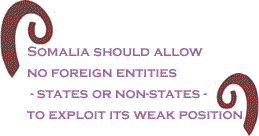If I
could think of any tactfully discreet and diplomatically
clear way to describe the outcome of the 15th Extraordinary
Session of the IGAD Assembly of Heads of State and Government
on Somalia without compromising
the essence of my message, I would have simply chosen that
approach. Therefore, going crude is the appropriate way:
As a patched up political
charade destined to embolden the very extremist elements
that it is intended to subdue and push Somalia deep into
anarchy and destruction, the resolution passed in that session
is haphazardly imprudent and wildly dangerous.

IGAD was right in describing
Somalia�s still-raging political fire as a situation
likely to pose a serious threat to the stability of the
region and perhaps beyond. However, IGAD is wrong in hastefully
approving to send troops from the �frontline states� to
Somalia despite the fact that
the UN Resolution 1725 bans the deployment of any troops
from bordering states. IGAD is planning to immediately send
2000 troops and possibly add another 15,000 at a later date.
This, needless to say,
means that Ethiopian troops would inevitably be part and
parcel of the first contingent, the latter, or all. After
all, in the Horn, in terms of military might, experience,
and political clout, Ethiopia
holds unmistakable distinction that could even guarantee
her the AMISOM command.
Already, in an action
item that is bound to undermine the credibility of AMISOM
and confuse its command center, IGAD directed its Secretariat
to open an office in Mogadishu
within 15 days. The purpose of this office is described
as �(to) enable AMISOM and IGAD establish in Mogadishu an
operational level coordination mechanism to strengthen and
harmonize their support to the Transitional Federal Government
in the areas of training, establishment of command and control
structure.�
Evidently, this swift
move comes at a time when, in the US, consensus favoring a policy toward Somalia that is based on constructive
engagement instead of the �constructive disengagement� that
was being pushed by some analysts, is gaining momentum.
 Unlike
the failed policy of the previous administration that was
entirely based on counter-terrorism and military power,
the soon-to-be-announced policy of the current administration
is expected to rely on soft power and building relationships. Unlike
the failed policy of the previous administration that was
entirely based on counter-terrorism and military power,
the soon-to-be-announced policy of the current administration
is expected to rely on soft power and building relationships.
More strangely, the
IGAD move comes at a time when the TFG has successfully
expanded the areas that it controls in Mogadishu, and the Somali Diaspora is vigorously pushing the TFG toward
dialogue and reconciliation.
The timing does indeed
raise certain questions, if not suspicions.
The wounds from the
brutal two year Ethiopian occupation that killed over 20,000
Somalis and gave al-Shabaab its current status are still
nightmarishly fresh. Mind you, the current TFG is a coalition
government made of those who ushered in Ethiopia and those who resisted the occupation.
However, it is no secret that this coalition is already
hanging from a cliff as a number of the cabinet members
representing the Islamist side have been killed, sacked
or pressured out since the Djibouti agreement.
The scale is clearly
lopsided as individual ministers regardless of their competence
and productivity were unabashedly replaced in the recent
controversial TFG reshuffle while other questionable characters
are awarded key positions. And as the argument goes: two
decades later, Ethiopia still micromanages Somalia�s internal political
affairs as it became apparent in the TFG agreement with
the ever-morphing Ahlus Sunnah wal Jamaah.
Understandably, Ethiopia has certain security concerns; and these
concerns should be addressed through the appropriate channels.
It is in the best interest of Somalia
to forge peace treaty reflecting national and regional security
threats and the future economic opportunities with Ethiopia and other neighbors. However, Somalia
should allow no foreign entities - states or non-states
- to exploit its weak position and dictate their political
wish-list to it or infringe in its sovereignty.

In fairness however,
Ethiopia
is not the only potential impediment to sustaining the Djibouti agreement and paving the way for lasting
peace and reconciliation. Bloody-handed Somalis still continue
to position against one another for zero-sum gains.
At the end of the day,
it is the Somalis who would have to learn at this time of
great adversity to make peace with one another, and make
space for one another.
So, internally, it is
time to raise the bar, though nothing of significance could
happen until our human capacity and attitudes are profoundly
improved; and that may not happen until something extraordinary
that would compel the Somali Diaspora to reconnect with
its homeland emerges.
Meanwhile, as a profoundly
brain-drained nation, Somalia is still
struggling to learn that nations, just like individuals,
are treated in ways that are equal to the self-respect that
they demonstrate. And, so long as those who grab power (or
are entrusted with) continue to fall over each other into
the very condition that ultimately humiliates their persons
and subjugates their country, business will continue as
usual.
Finally, though arming
one faction against another might create a temporary advantage
to one group or another; it does not produce a viable long-term
security and lasting peace. Therefore, continued exploitation
and indeed subjugation of Somalia
can only prolong the bloodshed and misery. And under such
condition, neither Somalia, nor the region, nor the community of nations
that rely economically on the Indian Ocean and Red
Sea could benefit in the long run.
BlackCommentator.com Guest Commentator, Abukar Arman, is a freelance writer
whose articles and analyses have appeared in the pages of
various media groups and think tanks. Click here
to contact Abukar Arman. |

